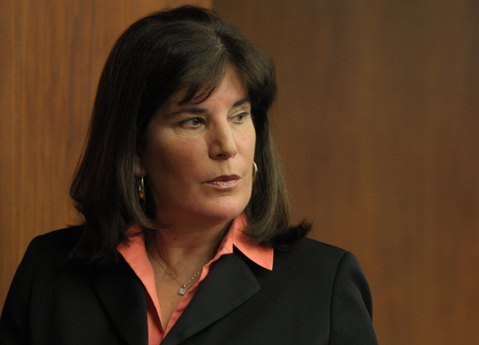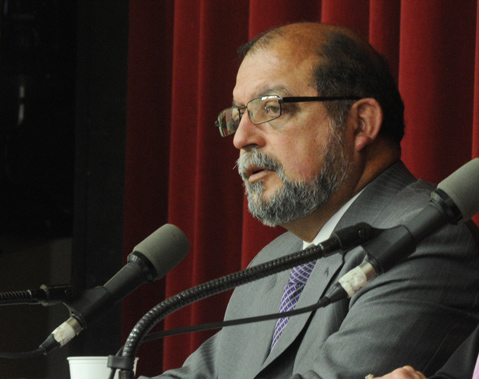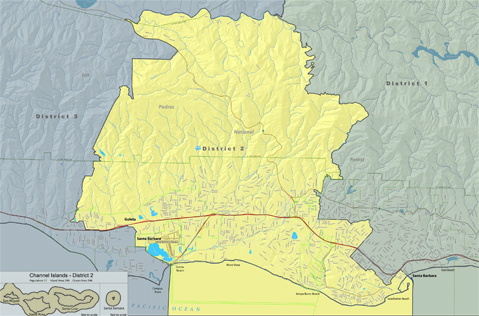The Battle for Santa Barbara’s 2nd District
Roger Aceves Tries to Unseat Janet Wolf

Before March 18, it looked as if the battle for the 2nd District supervisorial seat would be the battle for Goleta Beach Park. The dispute? Rocks and whether they should stay or go. For years, the citizens of Goleta had been fighting over whether or not to keep a rock wall that protected the park lawns from ocean flooding during a major storm. Environmentalists long argued the rocks were causing sand erosion that would eventually destroy the beach. Seizing this as a popular issue — the most visited county beach — Goleta City Councilmember Roger Aceves, who is challenging Supervisor Janet Wolf for her third term, took a stand in favor of the rocks. He gambled, and it seemed a safe bet that Wolf would ally herself with the environmentalists. The moment of truth arrived on March 1, when a major storm — one of the biggest in years — descended on Goleta Beach.
The beach and the park weathered the storm. But before Aceves could gain much momentum from his persistent attacks on Wolf over what he supposed would be her support for the anti-rock crowd, Wolf moved quickly. Taking control of the board meeting on March 18, she convinced the other supervisors to vote in favor of keeping the rocks. Though Aceves charged Wolf with being a flip-flopper, Wolf countered that she had made her decision based on the facts. The battle — at least until the Coastal Commission takes it up many, many months from now —had ended in a draw. That left both candidates facing the truly biggest challenge in the 2nd District race: voter turnout.
Since this is a non-presidential year, voter interest is typically low. Usually this means that more conservative voters cast ballots, which should favor Aceves, but incumbents usually do well in off years, so that would favor Wolf. Though three important county issues will be decided on June 3 — the 2nd District, the Sheriff’s race, and Measure M — most of the ballot concerns primary races, including reelection bids for Governor Jerry Brown and Congressmember Lois Capps. These won’t be finally decided until November. This adds to the worry that voters won’t have been paying attention when the absentee ballots are mailed out on May 5. So Aceves and Wolf will have only a handful of weeks to convince voters in the 2nd District — which covers most of the City of Goleta, the western part of the City of Santa Barbara, and the unincorporated region in between —that this is an important election and that there are meaningful issues at stake.
At first glance, Aceves and Wolf might not seem all that different. Both are Democrats. Both had long careers working in the community. He served as a county deputy sheriff and an officer for the Santa Barbara Police Department; she was a teacher, small-business owner, and Goleta school boardmember. Aceves married his high school sweetheart; Wolf her junior high school sweetheart. They’ve been allies in the past, endorsing each other in previous elections. And they agree on issues beyond Goleta Beach, including opening the North County Jail and preserving More Mesa.
But in three highly contested areas — maintenance funding, energy projects, and Chumash development — the candidates have divergent opinions, opinions that could dramatically change the board’s direction and have major implications not just for the 2nd District but for the county as a whole.

Candidate in Search of an Issue
While Wolf’s campaign has stayed focused on her past record and trying to not make any serious mistakes, Aceves has taken the offensive, calling for managing the budget, spending money on infrastructure, preserving public safety, reforming campaign disclosure rules, and ending the tax-sharing deal between the City of Goleta and the county. Wolf charges that Aceves’s proposals are often counterproductive, or unnecessary, and that “he is a candidate in search of an issue.”
Like two-time Wolf challenger Dan Secord before him, Aceves claims that the projected $900 million county budget has not been properly handled: “We really didn’t have a good plan going into the recession, and I’m afraid that we don’t really have a good plan coming out of it.” Wolf counters that the county has a strong bond rating and a 17-year plan to pay down its $800 million unfunded pension liability and that going into the next fiscal year, it has an expected slight surplus.
Despite his worries about the budget, Aceves has all but endorsed Measure M, an initiative spearheaded by Supervisor Peter Adam that would require the board to spend anywhere from $17 million-$39 million a year on the upkeep of county-owned roads, parks, and buildings. A wide array of county officials have repeatedly warned that Measure M could mean big trouble for public-safety funding, particularly for the delicate plan to save the millions of dollars needed for jail operations once the new jail opens in 2018. “Can they both coexist? Yes,” Aceves said. “Will it be difficult? Yes.” He has suggested selling some county facilities, such as the Santa Barbara Bowl, to their operators and using that money for maintenance. Where those operators would get that money has not yet been discussed.
Wolf joins her three remaining colleagues, Salud Carbajal, Doreen Farr, and Steve Lavagnino, in agreeing with the county’s auditor-controller, Bob Geis (who appears in a television ad endorsing her), and Sheriff Bill Brown, who both oppose the measure. “You cannot be in favor of public safety and support Measure M,” she said.
Aceves has also made much ado about what is legally nothing but what he says is ethically something: accepting campaign donations before a vote. He accused Wolf of engaging in a “pay-to-play” system in which she received checks of $20,000 and then $40,000 from the Service Employees International Union (SEIU) days before the board discussed SEIU-related matters. He said she should have mentioned the money, but the California Fair Political Practices Commission clearly doesn’t require that of county supervisors. The candidates do have to file disclosure forms with the county elections office, which are publicly available. “Thankfully, there are rules,” Wolf said, calling for the forms to be posted online. Aceves hasn’t suggested anything specific beyond that, but at a recent Goleta council meeting regarding Venoco, he did mention the $500 the company gave him.

A County Divided?
Ending the tax-sharing deal entered into between Goleta and the county at the time of Goleta’s incorporation in 2002 has been on Aceves’s “bucket list” for a long time. Known as the revenue-neutrality agreement (RNA), it was approved by voters at the time as a way of compensating the county for lost revenue from the new city. In recent years, city officials, led by Councilmember Jim Farr and Mayor Michael Bennett, have been increasingly complaining about the agreement. It’s unfair to make the city forever fork over millions every year — through percentages of property and sales taxes and formerly hotel bed taxes — to the county, Aceves said, as the city could use that money to revitalize Old Town or create a civic center or parks department.
Wolf’s response? The RNA’s end would mean more money for Goleta but less money for the county to provide services to many of the 80,000 2nd District residents who live outside the city limits in the unincorporated area between Goleta and Santa Barbara. She said she’d be open to negotiations in the future — past attempts have gone nowhere — but is quick to point out that the county forgave $1.5 million it loaned the city when it formed.
Still, Aceves frequently draws parallels between the county’s relationship with Goleta and the board’s relationship with North County. He said he plans on being not just a 2nd District supervisor but a “regional” supervisor, particularly with respect to energy projects and the Chumash tribe — issues that often split 3-2 on the current board. He cited the November vote to approve Santa Maria Energy’s 136 cyclic steam-injection wells that also set a stricter greenhouse-gas-emissions limit than previously mandated. Wolf explained her vote as an effort to “balance” economic and environmental interests. Aceves, who attended that six-hour hearing, said all he saw was “disinterest” from the South County bloc of Wolf, Carbajal, and Farr. When asked about his views on hydraulic fracturing, or “fracking,” Aceves pointed out that the controversial practice doesn’t occur in Santa Barbara County and suggested more research be done on it. “They can keep studying it as long as they want,” Wolf argued, adding it is the county’s stringent regulations that discourage companies from fracking here. “We want to hold them accountable,” she said.
Wolf feels the same about the Chumash. She has explained her vote against the tribe’s Camp 4 annexation by saying they should go through the same planning process as any other project applicant. Aceves, however, thinks the board mishandled the tribe’s request and should have been more open to a dialogue. Wolf said the reason for Aceves’s “regional” view is simple. “I think maybe he’s using that as a way to explain away why he’s getting so much North County support,” she said. “One has to look at where those donations are coming from. I think that is a reflection of where he stands on issues.”
Follow the Money
Wolf has received some North County support, as well, but not as much as Aceves. His contributions include $27,000 from Santa Maria Energy; $20,000 from ERG Operating Company, LLC, which operates oil wells near Santa Maria; $4,000 from Santa Maria–based Pacific Petroleum, Inc.; and $1,500 from PetroRock, LLC, which just successfully applied for new cyclic steam-injection wells outside of Santa Maria.
The Santa Barbara Association of Realtors endorsed Aceves, and real estate and development interests have bolstered his campaign. Donations have poured in from — among others — Kinyon Construction in Santa Maria ($10,000), the Towbes Group ($5,300), and Westar Management ($2,500), whose in-construction mixed-use project was approved by the Goleta City Council in 2012. The Santa Barbara County Deputy Sheriff’s Association — which has also endorsed him — contributed $10,000, and the Chumash have committed $19,000.
A sizable slice of Wolf’s money has come from employee unions. She has received $90,000 from SEIU and $20,000 from the Santa Barbara County Firefighters Government Committee, both of which have endorsed her. Both candidates have the support of many individual donors. Santa Maria Energy officials said the company will be pumping more money to Aceves to “level the playing field” between his donations and Wolf’s SEIU donations. Fundraising totals for both candidates will likely spike leading up to Election Day; the most recent documents show that Wolf has amassed about $257,000 and Aceves has scored about $240,000.
Leadership and Values
In the endorsements game, Wolf has Aceves beat. She has dozens of former and current elected officials behind her, including three of Aceves’s council colleagues, as well as her colleagues Carbajal and Farr and many groups, including the Sierra Club, the Santa Barbara Women’s Political Committee, and the Democratic Party of Santa Barbara County. Daraka Larimore-Hall, the area party chair, said that he warned Aceves against challenging Wolf. Aceves said that the party’s decision not to support him provided “a lot of motivation.” In addition to the support of the Deputy Sheriff’s Association and the Santa Barbara Association of Realtors, he has scooped up Secord’s endorsement and said more are forthcoming.
Both Aceves and Wolf (as well as dozens of people interviewed) have framed this election as one that comes down to leadership and values. Aceves pointed to his record on the council, which includes votes to clean up Haskell’s Beach, preserve Bishop Ranch, and approve development projects with mitigations. Wolf cited her pushes for earlier county budget workshops and her votes to award modest employee contracts after years of cuts and to prevent parking fees at county beaches.
Aceves’s supporters said the board would benefit from the balance he could provide and the skills he could contribute from his law-enforcement career. “I’m really up to the task of providing balanced leadership,” he said, describing himself as a “roll-up-the-sleeves, get-the-job-done kind of guy.” Aceves, who speaks in a guttural voice with an easygoing manner and talks confidently of his chances, said he visits about 100 homes every day and has learned something talking to 2nd District residents. “One thing is clear: Voters are looking for a change.”
When asked why they support Wolf, people repeatedly said, “She does her homework.” Wolf, who speaks calmly and deliberately like a teacher, said she has some “unfinished business” on the board — including work on the Eastern Goleta Valley Community Plan — and that her constituents “know that they can trust me.” But first, she has to win the battle to keep her spot, a battle that she said years of playing sports has helped ready her for. “I like to win,” she said. “And I really do want to win this election.”
4•1•1
The deadline to register for the June 3 Primary Election is May 19. Vote-by-mail ballots will be mailed out starting May 5 and can be requested by mail until May 27. Visit sbcvote.com/Elections/UpcomingElections.aspx.



